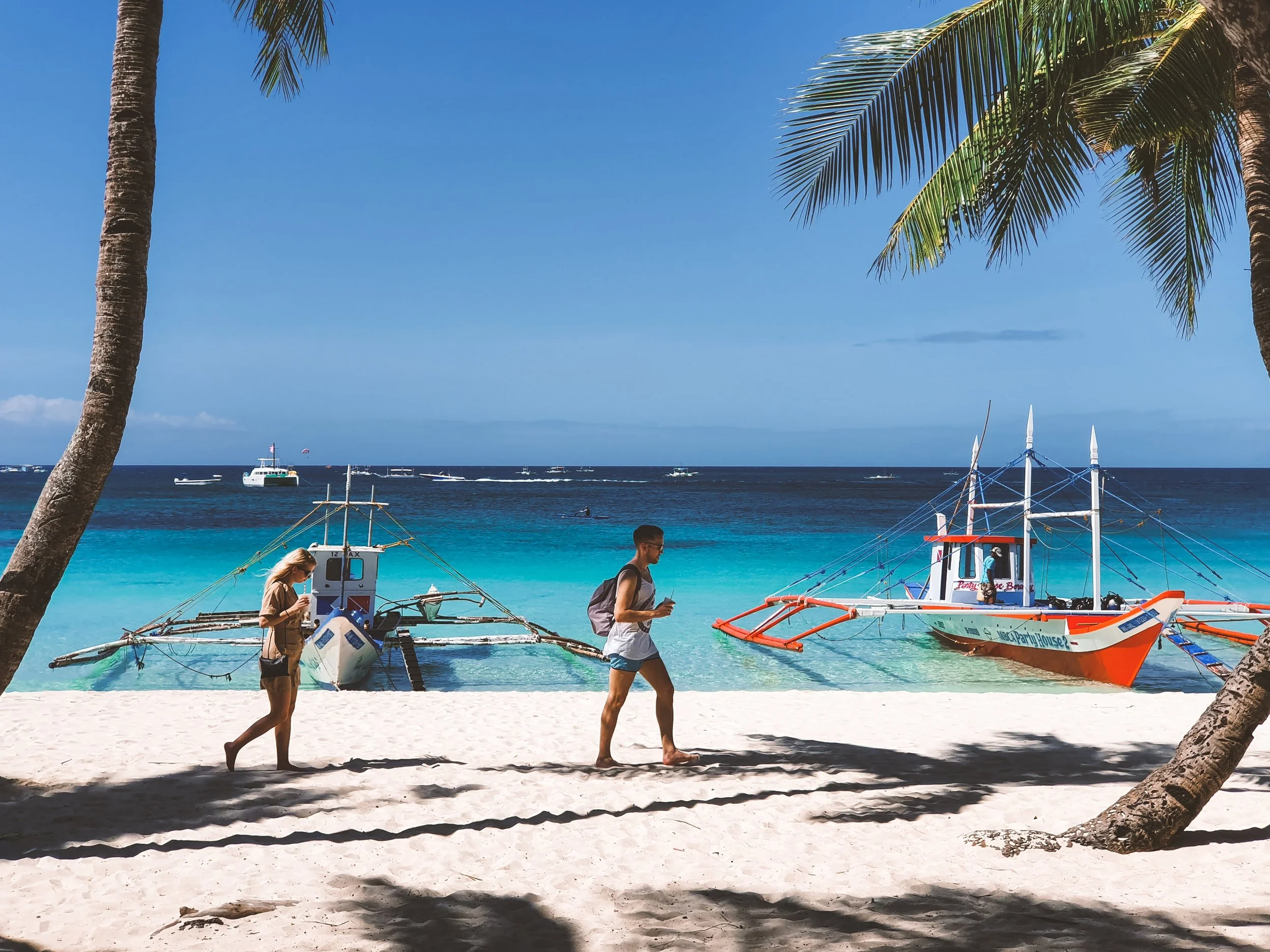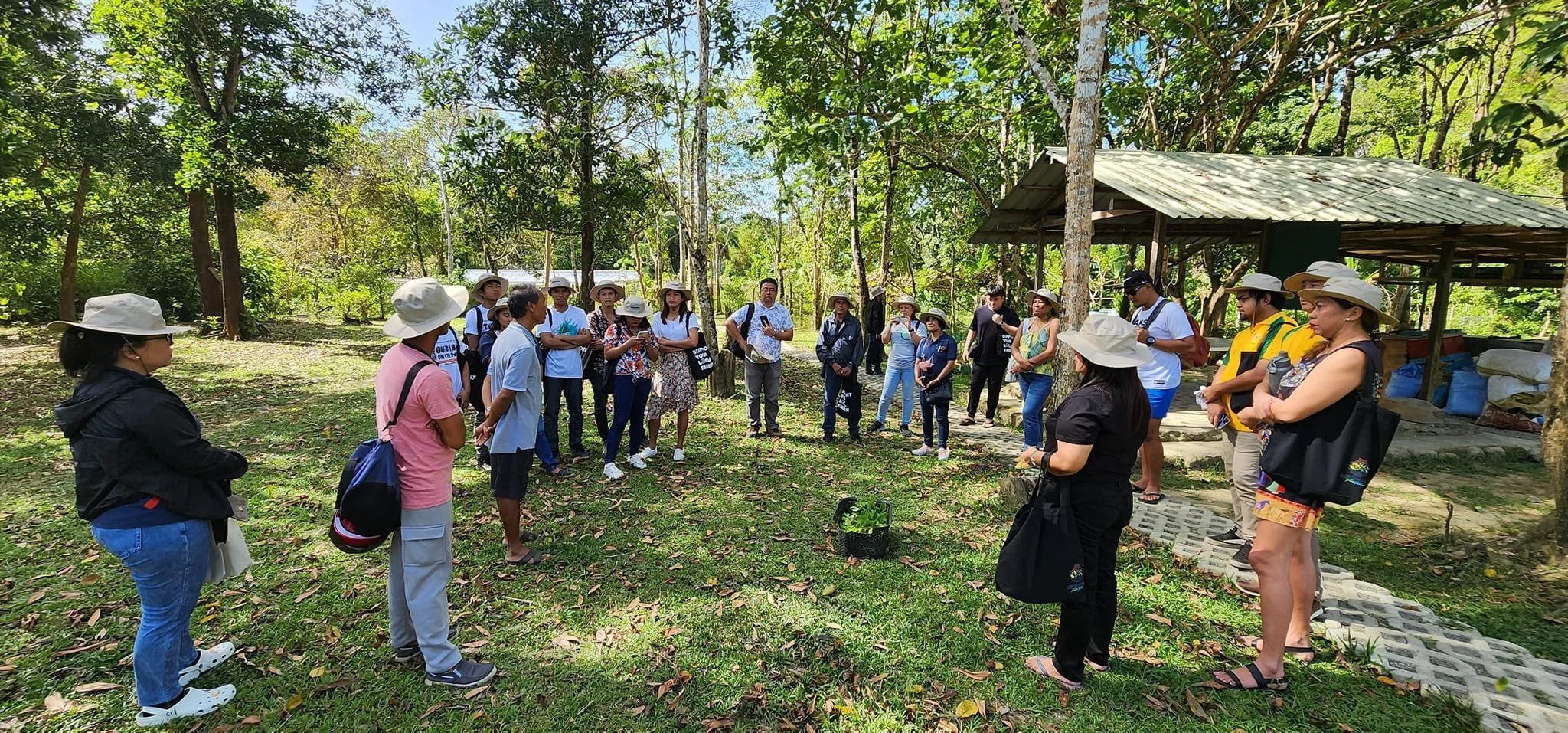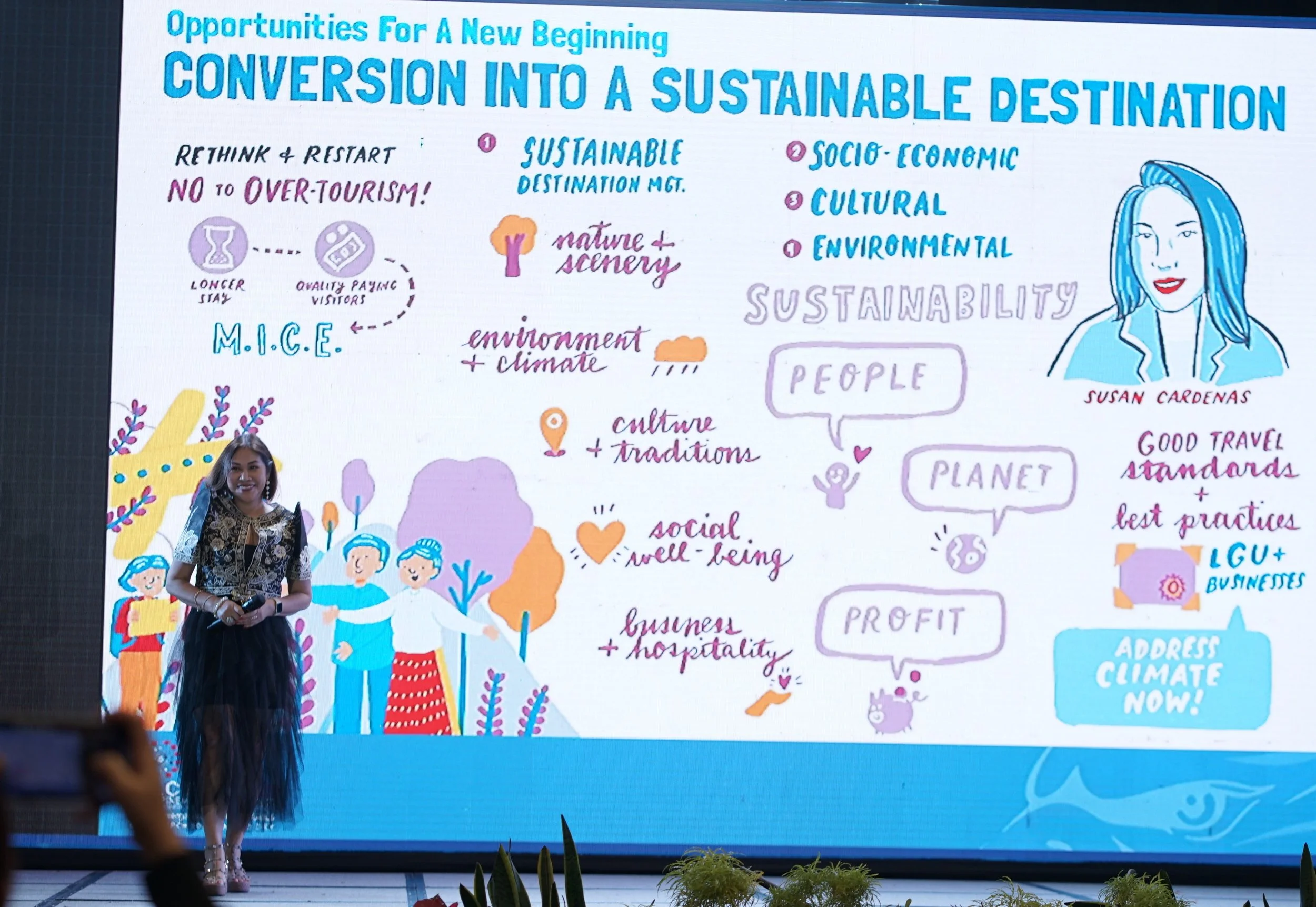Susan Santos de Cardenas:
Leading Sustainable Tourism Transformation with Capacity Building
By: Rhea Vitto Tabora
For Susan Santos de Cardenas, sustainable travel is a calling, a vocation, and a potent instrument to create tangible change. A staunch advocate for responsible tourism, she understands its transformative power — to invigorate local economies, safeguard cultural heritage, and conserve our planet for future generations.
As the President and CEO of the Society for Sustainable Tourism (SST), Susan is a tireless champion of ecotourism, community-based tourism, sustainable MICE (Meetings, Incentive Travels, Conventions, and Exhibitions), and agri-tourism development.
SST is a non-profit, non-governmental organization dedicated to training and empowering public and private stakeholders in achieving excellence in sustainable tourism and development, mitigating climate change, espousing social equity and responsibility, and promoting economic growth.
Susan's influence on sustainable tourism expands with her role as a trusted consultant and advisor to Local Government Units (LGUs) in the Philippines. Her extensive experience has propelled her to serve in important roles at some of the world’s leading sustainable tourism advocacy organizations. Her roles include Founding Board Member of Asian Ecotourism Network, Southeast Asia Partner and Representative of Green Destinations, and East & Southeast Asia Regional Coordinator of the Good Travel Program.
A sought-after keynote speaker, she generously imparts her knowledge at high-level conferences and workshops, including the 2022 GSTC Asia-Pacific Sustainable Tourism Conference in Korea (September 15 to 17, 2022), Green Destinations 2022 and Future of Tourism Summit in Greece (September 26 to October 1, 2022), MICECON 2023 (March 1 to 3, 2023), International Ecotourism Travel Mart 2023 (March 29 to April 2, 2023), and Sustainable Tourism: Leading the Recovery and Profitability of Business Operation in the Post-Pandemic Era in the Philippines (July 26, 2023).
Through her relentless dedication, she inspires and nurtures the next generation of sustainable tourism advocates while promoting climate change adaptation. Her continuous efforts encourage tourism, hospitality, and travel organizations to integrate proven sustainable practices into their operations.
Susan continues to inspire, advocate, and grow an enduring green impact, cementing her reputation as a true changemaker in Asia's sustainable travel landscape.
Susan, how did you get involved in sustainable tourism, and what inspired you to create the Society for Sustainable Tourism (SST)?
My journey into sustainable tourism began when I worked with Inkaterra, Peru's eco pioneer and sustainability leader. Their commitment to scientific research for biodiversity, community development, and sustainable practices ignited my passion for sustainable tourism.
However, it was my visit to Boracay Island in 2010 when I was invited as a guest speaker for Green Meetings/Sustainable Events that was the turning point.
The environmental degradation I witnessed there devastated me. That’s when I decided to dedicate myself to teaching, educating, and building capacity for sustainable tourism development and management not only in the Philippines but across every destination I visited.
Please share a specific moment or event in Boracay that deeply affected you and solidified your commitment to this cause.
Returning to Boracay after nearly a decade since my departure in 2001 was a jolt. It was heartbreaking to see the staggering environmental damage—wetlands decimated, buildings constructed without any oversight, and forests destroyed by illegal settlers.
That was the decisive moment when I knew I had to intervene by tapping into sustainable tourism principles, amplifying climate action education, and rolling out capacity training programs in the Philippines.
How does SST foster collaborations within the hospitality sector to promote sustainability?
Our mission is to educate and build the capacity of both public and private stakeholders in the tourism industry about sustainability and responsible stewardship of natural resources. We provide tools and frameworks for sustainable tourism development and management by comprehensively assessing destinations and businesses’ sustainability policies and practices, planning for improvements, learning from peers, and celebrating achievements with recognition and certification.
We engage both sectors to ensure they all share a common vision, principles and practices for sustainable tourism.
In 2018, then-President Rodrigo Duterte declared Boracay a “cesspool” and abruptly shut it down for rehabilitation from April to October. Photos by: Unsplash
“Our mission is to educate and build capacity of both public and private stakeholders in the tourism industry about sustainability and responsible stewardship of natural resources.
We provide tools and frameworks for sustainable tourism development and management by comprehensively assessing destinations and businesses’ sustainability policies and practices, planning for improvements, learning from peers, and celebrating achievements with recognition and certification.
We engage both sectors to ensure they all share a common vision, principles and practices for sustainable tourism.”
Can you share an example of a particularly successful collaboration and what made it so effective?
The Coron Initiative, aimed at nurturing a culture of sustainability, is a standout example. Almost a decade into this project, we’ve seen tangible results like the Coron Natural Farms. This initiative serves as a replicable model for tourism development, showcasing community-led solutions and circular economy principles, and ensuring food security.
The project has provided livelihood and sustenance for unemployed local residents, helped solve solid waste problems during the COVID-19 pandemic, and made Coron Natural Farms the go-to training venue for natural farming, in partnership with national agencies such as the Department of Agriculture and Technical Education and Skills Development Authority (TESDA), among others.
Photos by: Coron Natural Farms, the Philippines
“We know the problems; we know the solutions. The primary challenge is political will.
Destination Management Organizations (DMOs) or Local Government Units (LGUs) need to exercise good governance and harness political will to develop, manage, and adapt their natural and cultural assets to future-proof the tourism sector amidst the climate crisis. For this, we have the Green Destinations Awards to Certification Program.”
What do you identify as the most significant challenges facing the tourism industry in terms of sustainability, and how is SST working to address them?
Destination Management Organizations (DMOs) or Local Government Units (LGUs) need to exercise good governance and harness political will to develop, manage, and adapt their natural and cultural assets to future-proof the tourism sector amidst the climate crisis. For this, we have the Green Destinations Awards to Certification Program.
The industry stakeholders must also have policies and practices in place to achieve the triple bottom line of sustainability: people, planet, and profit.
We offer comprehensive training programs at various levels. These programs not only evaluate and certify sustainable practices but also provide tailored support and guidance to help businesses implement proven strategies. We welcome companies of all sizes, from large corporations to small businesses, including hotels, MICE venues, B&Bs, campsites, restaurants, activity providers, shops, visitor centers, local DMOs, and other enterprises.
At SST, our efforts are focused on educating and advocating sustainability, from principles to practices, to bring about change.
Can you provide a concrete example of how political will, or the lack thereof, has impacted a destination's sustainability efforts? How did this experience refine SST's approach?
Since 2010, we have hosted conferences and workshops to encourage different LGUs to adopt Sustainable Tourism standards and criteria.
Unfortunately, some LGUs have been reluctant to integrate and implement these standards, giving rise to issues like over-development and over-tourism.
On the other hand, destinations like Bago City and Sagay City have mandated the implementation of Green Destinations standards, and they are already well underway on their sustainability journey.
These experiences have reinforced SST's approach to prioritize education, capacity building, and advocacy for political will to adopt sustainable practices in the industry.
Could you highlight some of the sustainable tourism destinations that SST has helped develop and what distinguishes them from others?
Many destinations are a work in progress, but several LGUs have made significant strides in implementing sustainability principles and practices. These destinations have focused on environmental conservation and taken climate actions to benefit their communities.
Although their sustainability journey is ongoing, they have laid a strong foundation that sets them apart from others.
How do you envision the role of technology in shaping the future of sustainable tourism, and how is SST leveraging technology to advance sustainability efforts?
Technology plays a crucial role in shaping the future of sustainable tourism, especially in the post-pandemic era. It facilitates efficient and seamless management of tasks such as bookings, visitor management, and managing data toward sustainability efficiency.
At SST, we acknowledge the potential of technology to enhance sustainable practices to mitigate the climate impacts as the Philippines is very vulnerable to the climate crisis. By leveraging technology and AI applications, we strive for efficient operations while minimizing our ecological footprint.
What advice would you give to hospitality and travel professionals seeking to embrace sustainable tourism and promote responsible travel practices?
First and foremost, understanding global sustainable tourism standards is crucial. Begin practicing responsible travel by making small changes at home or during your holidays.
Visit and learn from other destinations as well as travel and hospitality businesses that have effectively and responsibly developed and managed their businesses.
Study the best practices implemented by various destinations and businesses in the travel industry.
The Green Destinations Good Travel Guide is an invaluable resource for discovering verified good practice stories.
Can you discuss some of the educational programs and training opportunities that SST offers for public and private stakeholders?
We offer DMOs and LGUs a comprehensive range of services that educate them on the fundamentals of sustainable tourism development and management, including policies and procedures.
We also assist in measuring and evaluating various sustainability indicators to enhance the development and implementation of effective tourism policies and strategies.
Our network of tourism and sustainability experts offers guidance to destinations with wide-ranging services, including the Green Destinations Awards and Certification Program, as well as support, training, recognition, and marketing for travel industry businesses through our Good Travel Program.
What are some of SST’s major success stories or achievements to date?
One remarkable success story for SST is Coron Natural Farms, an initiative led by our Coron Initiative Director. Despite the challenges caused by the COVID-19 pandemic, they have embraced sustainable and natural farming practices.
Not only did they survive during the two-year tourism shutdown, but they have also provided livelihoods for their dedicated staff and families.
Their farm has even yielded surplus food and vegetables while effectively addressing ecological solid waste management.
How does SST collaborate with other organizations, such as the Asian Ecotourism Network, to promote sustainability in the tourism industry?
As the Southeast Asian Partner and Representative of Green Destinations and the East Asia Coordinator for the Good Travel Program, SST actively collaborates with organizations like the Asian Ecotourism Network, where I serve as the Vice Chair.
Our goal is to promote sustainability in the tourism industry. We exchange knowledge and expertise in sustainable tourism programs and services with our network partners. Together, we strive to advance sustainable practices and create a transformative impact on the industry.
What are some of the goals and initiatives that SST is currently undertaking, and how can hospitality and travel professionals get involved?
SST is currently working on various goals and initiatives. One of these is the annual Top 100 Stories Competition, which serves as a springboard for all LGUs—cities, towns, municipalities, regions, and even private destinations—encouraging them to embark on their sustainability journey.
We offer extensive support, training, and capacity building for these destinations, empowering them to establish their Sustainability or Green Team. This initiative extends further to the Green Destinations Awards and Certification Program to recognize and promote sustainable actions and implementations.
Similarly, for businesses, our local representatives extend invitations to all private stakeholders in the hospitality, travel, transport, and leisure sectors of the tourism industry. We provide support, certification, and promotion to ensure the growth and success of this resilient sector.
“First and foremost, understanding global sustainable tourism standards is crucial. Begin practicing responsible travel by making small changes at home or during your holidays.
Visit and learn from other destinations as well as travel and hospitality businesses that have effectively and responsibly developed and managed their businesses.
Study the best practices implemented by various destinations and businesses in the travel industry.”
For the Top 100 Stories Competition, could you share a story from a previous winner? What made their story stand out, and what impact did winning the competition have on their sustainability journey?
One inspiring story from a previous winner of the Top 100 Stories Competition is Bago City’s Good Practice Story for Environment & Climate. They shared their efforts to save the Bago watershed, which earned them second place among participants from around the world in the 2022 Green Destinations Top 100 Stories.
Another remarkable story comes from Sagay City, whose Mangrove Forest Protection through Community-based Ecotourism Project also made it to the Top 100 Stories. They not only won second place overall but also received the coveted People’s Choice Award.
Winning the competition had a significant impact on both cities' sustainability journeys. It brought global recognition to their sustainable practices and initiatives, inspiring other destinations to follow their lead.
The accolades they received during the ITB event in Berlin in March 2023 further solidified their commitment to sustainability and encouraged them to continue their efforts toward creating a greener future.
Is there anything else about yourself, your work, or sustainable travel practices that our readers should know about?
For LGUs and DMOs, I encourage travel companies and professionals to start a sincere sustainability journey with Green Destinations’ Green Destinations Awards to Certification Program.
This comprehensive program offers support, recognition, and certification, paving the way for the future we desire. By participating in this program, a company is leaving a lasting legacy not just for the constituents that it serves today but for future generations as well.
To businesses in the tourism sector, remember to prioritize the triple bottom line principle of sustainability – people, planet, and profit. By taking action and adopting sustainable practices, you contribute to the well-being of local communities and the environment, and also enhance your profitability. Sustainability-focused practices help reduce operational costs and protect your investments, ensuring equal economic opportunities for your grandchildren's children.
If you know someone who deserves recognition as Asia’s Sustainable Travel Changemaker, please click on the link below to nominate your candidate or even yourself. Or you can also email us directly. Please read our privacy policy.
SELECTED FOR YOU

















